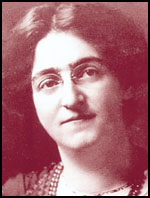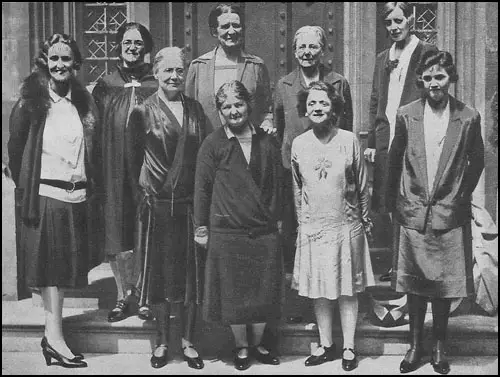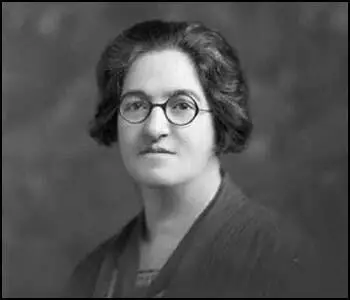Marion Phillips

Marion Phillips, the youngest in the family of three sons and four daughters of Phillip David Phillips (1836–1909), an Australian-born Jewish lawyer, and his wife, Rose Asher, was born on 29th October 1881, at St Kilda, near Melbourne in Australia. She was educated at home, at the Melbourne Presbyterian Ladies' College (1897–8), and then at Ormond College, part of Melbourne University, where she studied philosophy and history.
In 1904 she went to England to study at the London School of Economics (LSE). Her tutor, Graham Wallas, introduced her to Sidney Webb and Beatrice Webb. This resulted in her being employed as a research assistant into their investigation into public health, poor-law medical relief, and the treatment of destitute children. During this period she became a member of the Fabian Society, the Independent Labour Party and the National Union of Women's Suffrage Societie. In 1909 she decided to move into the Holland Park house of a fellow researcher, Dr Ethel Bentham.
Ella Winter, knew Phillips when she lived as a child in Australia. "We all admired her extravagantly - her brilliant mind and effectiveness as a speaker, her activities as suffragist, pacifist, labour organizer... It was a red-letter day for us all when Marion came. She was striking-looking, with black hair, small hands and feet, intense brown eyes - and a stout, uncorseted, ungainly body, which one forgot in the acute discussions she always brought into being. I sat on a hassock, ears and eyes glued to her, drinking in what she said about events, political personalities - she knew everyone - and policies. She made public questions so alive and fascinating that I am sure politics must fill my world; Marion lived as I wanted to live, I would pattern my career on hers. I would not need to marry, any more than she had. My life, like hers, would be in my work."
Phillips graduated DSc (Econ) with a doctoral thesis on the development of New South Wales. This was published in 1909 as "A Colonial Autocracy". In 1911 she became a lecturer at the LSE but the following year she became secretary of Women's Labour League. She also worked behind the scenes in order to develop closer links between the Fabian Society and the Labour Party.
In 1912 Phillips was elected a Labour councillor in the London borough of Kensington, where she pressed for public provision of baby clinics, school meals, improved council housing, employment schemes, and prohibition of sweated labour. As Natasha Lehrer has pointed out: "A prime motivation was the desire to see working class children being given both the protection and the opportunities that she herself had received during her happy middle-class childhood in Australia. She also fought for better medical inspection and treatment of school children."
During the First World War she was a member of the War Emergency Workers' National Committee, the Consumers' Council of the Ministry of Food, and the Central Committee on Women's Training and Employment. In 1918 she edited a volume of essays, Women and the Labour Party, which attempted to show "the contribution which the Labour Party has to make upon questions that are peculiarly the concern of women".
Phillips developed an abrasive personality. Katharine Bruce Glasier commented to Ramsay MacDonald that Phillips reminded her of Eleanor Marx in "her love of power and intrigue". She added "if only she could fall in love and mate and marry.... but just now she is as hard and cold as glass". Throughout her career Phillips was known for her powerful and abrasive manner. Beatrice Webb described her as "shrewd and capable but contentious" and in May 1918 referred to Phillips's "insolently critical attitude towards all persons and institutions" and her "sharp satirical tongue" made her "much disliked by the other leading women of the labour movement".
Her biographer, Brian Harrison, was more sympathetic and has argued: "Phillips, and many women like her, worked hard at the undramatic but necessary organizational tasks involved in creating a new political constituency, settling where necessary for the practical, but never losing sight of the ideal. She was particularly active in advancing women's interests on international bodies, and in pressing for improved working-class housing estates to include community centres with nurseries, communal kitchens, libraries, concert halls, and home-help services; all these she saw as not merely desirable in themselves but as essential to emancipate working-class housewives."
Phillips was extremely hostile to the Russian Revolution. In 1921 she became involved in a heated debate with the journalist, Lincoln Steffens, who had just returned from Russia. One of her former students, Ella Winter, later described the incident: "When the conversation turned to the Russian Revolution and Bolshevism, the evening, to my dismay, exploding into astonishing hostility and bitterness from Marion Phillips. Like the official Labour Party, she was implacably opposed to the Russian Revolution, but it did not occur to me that her enmity and personal rudeness may have been partly due to her realization that she was losing me."
Phillips upset some women activists by strongly opposing committing the Labour Party to promoting birth control in the 1920s. She was concerned that it would lose votes from the Roman Catholic working-class She told one of the campaigners, Dora Russell, "sex should not be dragged into politics" and the birth-control issue had the power to "split the party from top to bottom".
In the 1929 General Election Phillips was elected to represent the constituency of Sunderland. The Conservative Party won 8,664,000 votes, the Labour Party 8,360,000 and the Liberal Party 5,300,000. However, the bias of the system worked in Labour's favour, and in the House of Commons the party won 287 seats, the Conservatives 261 and the Liberals 59. Ramsay MacDonald became Prime Minister, but as before, he still had to rely on the support of the Liberals to hold onto power.

The election of the Labour Government coincided with an economic depression and MacDonald was faced with the problem of growing unemployment. In January 1929, 1,433,000 people were out of work, a year later it reached 1,533,000. By March 1930, the figure was 1,731,000. In June it reached 1,946,000 and by the end of the year it reached a staggering 2,725,000. That month MacDonald invited a group of economists, including John Maynard Keynes, J. A. Hobson, George Douglas Cole and Walter Layton, to discuss this problem. However, he rejected all those ideas that involved an increase in public spending.
In March 1931 Ramsay MacDonald asked Sir George May, to form a committee to look into Britain's economic problems. The committee included two members that had been nominated from the three main political parties. At the same time, John Maynard Keynes, the chairman of the Economic Advisory Council, published his report on the causes and remedies for the depression. This included an increase in public spending and by curtailing British investment overseas.
The Chancellor of the Exchequer, Philip Snowden, rejected these ideas and this was followed by the resignation of Charles Trevelyan, the Minister of Education. "For some time I have realised that I am very much out of sympathy with the general method of Government policy. In the present disastrous condition of trade it seems to me that the crisis requires big Socialist measures. We ought to be demonstrating to the country the alternatives to economy and protection. Our value as a Government today should be to make people realise that Socialism is that alternative."

When the May Committee produced its report in July, 1931, it forecast a huge budget deficit of £120 million and recommended that the government should reduce its expenditure by £97,000,000, including a £67,000,000 cut in unemployment benefits. The two Labour Party nominees on the committee, Arthur Pugh and Charles Latham, refused to endorse the report.
The cabinet decided to form a committee consisting of Ramsay MacDonald, Philip Snowden, Arthur Henderson, Jimmy Thomas and William Graham to consider the report. On 5th August, John Maynard Keynes wrote to MacDonald, describing the May Report as "the most foolish document I ever had the misfortune to read." He argued that the committee's recommendations clearly represented "an effort to make the existing deflation effective by bringing incomes down to the level of prices" and if adopted in isolation, they would result in "a most gross perversion of social justice". Keynes suggested that the best way to deal with the crisis was to leave the Gold Standard and devalue sterling. Two days later, Sir Ernest Harvey, the deputy governor of the Bank of England, wrote to Snowden to say that in the last four weeks the Bank had lost more than £60 million in gold and foreign exchange, in defending sterling. He added that there was almost no foreign exchange left.
Ramsay MacDonald went to see George V about the economic crisis on 23rd August. He warned the King that several Cabinet ministers were likely to resign if he tried to cut unemployment benefit. MacDonald wrote in his diary: "King most friendly and expressed thanks and confidence. I then reported situation and at end I told him that after tonight I might be of no further use, and should resign with the whole Cabinet.... He said that he believed I was the only person who could carry the country through."
According to Harold Nicolson, the King decided to consult the leaders of the Conservative and Liberal Parties. Herbert Samuel told the King that he should try and persuade MacDonald to make the necessary economies. Stanley Baldwin agreed and said he was willing to serve under MacDonald in a National Government.
After another Cabinet meeting where no agreement about how to deal with the economic crisis could be achieved, Ramsay MacDonald went to Buckingham Palace to resign. Sir Clive Wigram, the King's private secretary, later recalled that George V "impressed upon the Prime Minister that he was the only man to lead the country through the crisis and hoped that he would reconsider the situation." At a meeting with Stanley Baldwin, Neville Chamberlain and Herbert Samuel MacDonald told them that if he joined a National Government it "meant his death warrant". According to Chamberlain he said "he would be a ridiculous figure unable to command support and would bring odium on us as well as himself."
On 24th August 1931 Ramsay MacDonald returned to the palace and told the King that he had the Cabinet's resignation in his pocket. The King replied that he hoped that MacDonald "would help in the formation of a National Government." He added that by "remaining at his post, his position and reputation would be much more enhanced than if he surrendered the Government of the country at such a crisis." Eventually, he agreed to form a National Government. Marion Phillips, like most Labour Party MPs was appalled by what they considered to be MacDonald's act of treachery.
On 8th September 1931, the National Government's programme of £70 million economy programme was debated in the House of Commons. This included a £13 million cut in unemployment benefit. Tom Johnson, who wound up the debate for the Labour Party, declared that these policies were "not of a National Government but of a Wall Street Government". In the end the Government won by 309 votes to 249, but only 12 Labour M.P.s voted for the measures.
On 26th September, the Labour Party National Executive decided to expel all members of the National Government including Ramsay MacDonald, Philip Snowden, Jimmy Thomas and John Sankey. As David Marquand has pointed out: "In the circumstances, its decision was understandable, perhaps inevitable. The Labour movement had been built on the trade-union ethic of loyalty to majority decisions. MacDonald had defied that ethic; to many Labour activists, he was now a kind of political blackleg, who deserved to be treated accordingly."
The 1931 General Election was held on 27th October, 1931. MacDonald led an anti-Labour alliance made up of Conservatives and National Liberals. It was a disaster for the Labour Party with only 46 members winning their seats. Phillips was one of those who lost their seats.
Marion Phillips died from stomach cancer, on 23rd January 1932 at the Empire Nursing Home, Vincent Square, London; she was cremated at Golders Green on 27 January.
Primary Sources
(1) Ella Winter, And Not to Yield (1963)
We all admired her extravagantly - her brilliant mind and effectiveness as a speaker, her activities as suffragist, pacifist, labour organizer... It was a red-letter day for us all when Marion Phillips came. She was striking-looking, with black hair, small hands and feet, intense brown eyes - and a stout, uncorseted, ungainly body, which one forgot in the acute discussions she always brought into being. I sat on a hassock, ears and eyes glued to her, drinking in what she said about events, political personalities - she knew everyone - and policies. She made public questions so alive and fascinating that I am sure politics must fill my world; Marion lived as I wanted to live, I would pattern my career on hers. I would not need to marry, any more than she had. My life, like hers, would be in my work.

